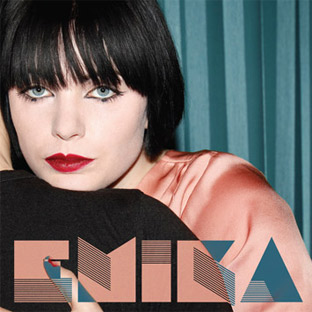My first impulse is to cast Emika’s eponymous Ninja Tune debut in the same light as recent dubstep offerings from the likes of Katy B and SBTRKT, which aim for pop crossover while still tethered to UK bass inclinations. Katy B is admittedly more floor-ready than the downbeat R&B emotionalism of SBTRKT and his ilk, but both have a pretense based in a contemporary pop-friendly mindset. Bristol, UK acolyte, Berlin-based producer Emika has little in common with any of that besides the descriptor “pop” being tangentially applicable to the young Englishwoman’s atmospherically brooding compositions. In fact, besides the colossal grinding bass that dominate these songs, Emika is more immediately comparable to Portishead, both in mood and in the similarity between Beth Gibbons’ voice and her own. Trip-hop is an easy reference point to latch onto when approaching Emika, but it would also undermine the singular voice at work here.
Emika’s pallet is simple and pervasive, wrapping the gigantic, writhing sawtooth bass punctuated by locked Ninja Tune percussion with digitally resonate synthesizers, snippets of smokey piano, and her dangerously jagged whisper to create icy noir pop. Emika plays the part of willfully abused lounge singer, rarely reaching far outside the realm of half-lidded, resigned and leering. It’s not hard to see most of these songs descending into melodrama with a less grounded vocalist behind them, but as it is, Emika breathes sultry attitude and sharpened charisma. The vocals remain textural even as they lyrically guide the overtly sadomasochistic mood (“Hit me if you think it’ll help the pain”). I wouldn’t call Emika Gothic as the brand of darkness on display here feels too internalized and personal and upbeat, but it’s not a stretch to say the record brings recent electro Goth acts like Austra to mind.
On Emika, palpable, silhouetted atmosphere is favored considerably over melody and overt hooks, but there is an undeniable economy and immediacy to the arrangements. Despite Emika’s ability as stalwart producer showing a similar technical aptitude to someone like Caribou, there remains a deft hand guiding these songs. Opener “3 Hours” unfurls its thickened throaty synths before dropping into a driving 4/4 thump and growling bass synth while tremolo dial tone flourishes flutter in precise alterations around the edges of the eardrum-tickling bass. The song drops out to let an inviting piano melody take over before the bass and tendrils of machine synthesis collapse on top for a spiraling melodic finale.
But it is the production that gives Emika its legs. These songs manage a peerless balance between oppressively physical and whispering introversion. It can’t be overstated how heavy this record is while never feeling bombastic or atonal. The malicious, heaving bass hooks dominate the album, but the intricacies remain clear and intact and Emika’s voice has more than enough room without fighting the mid-range for space. There’s a purposeful and clinical arrangement that’s as functional as it is engaging to listen to, managing to build tone and giving these songs striking urgency. It’s great to hear a voice as defined as Emika’s come out of the bass scene. Prior to Emika, she managed to spread herself out across the European underground with some notable collaborations (The Brandt Brauer Frick Ensemble, Tommy Four Seven), co-signs, singles, and compilations, but it’s reassuring and delightful to have a debut this excellent to cement her place.

